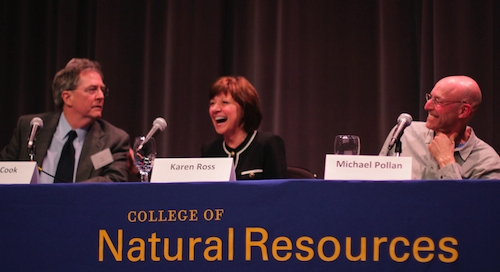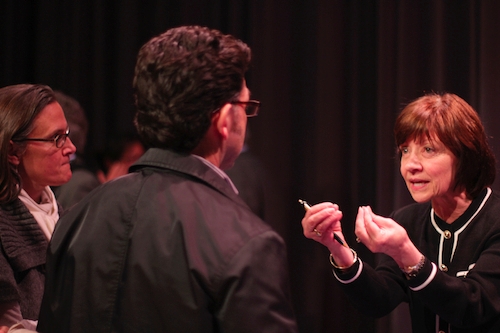The U.S. Farm Bill: What's at stake?
The United States farm bill is up for renewal this year, and what goes into the $400 billion, 5,000-plus page piece of legislation will affect what tens of millions of Americans eat — and don’t eat — in the coming years. On April 5, UC Berkeley’s College of Natural Resources fired off an enlightening salvo in the public discourse, with a panel of heavy hitters calling on the public to let their voices be heard in the quest to, as panelist Karen Ross, Secretary of the California Department of Food and Agriculture, put it, “move farmers and eaters closer together.”

Looking at the bill’s history, it’s not surprising the two groups have been driven apart. The farm bill was implemented during the Great Depression in the 1930s in order to raise commodity prices and farmers’ incomes, said Gordon Rausser, UC Berkeley professor of agricultural and resource economics and the event’s moderator. The commodities it focused on — food grains, feed grains, dairy, tobacco and peanuts — became political powerhouses while much of the food on our dinner tables — fruits, vegetables, and nuts — were relegated to the category of “specialty crops.”
Broccoli and oranges … specialty crops? “That’s what we grow here in California,” Ross said. And that's what's on the U.S. Department of Agriculture’s food plate. In the past 15 years such growers have been taking a more active role in the farm bill to make sure they are not marginalized, she said.
Over eight decades the bill has morphed from a farm to a food bill, the panelists said. Seventy-seven percent of the bill now goes to support the federal Supplemental Nutritional Assistance Program (SNAP), the reinvention of the food stamps program.
Ken Hecht, just retired from his position as the director of the California Food Policy Advocates, reeled off some facts about the people who use SNAP:
- 50 percent are working households
- 93 percent are below the poverty level
- 50 percent of benefit recipients are children
- 75 percent are households with children
“There are 1.3 million children who are getting enough to eat because of this program,” Hecht said. “It avoids all those consequences of food insecurity that we all know about: lack of adequate nutrition, lack of adequate health, lack of academic opportunity and performance, lack of social development.” The program not only helps its participants, Hecht, said, but the rest of the people in the community as well.
In addition to SNAP, support for sustainable agriculture emerged as a theme of the presentation. For insight, In Defense of Food author and UC Berkeley journalism professor Michael Pollan offered the audience the perspective of a Martian: we Earthlings are now eating oil instead of eating sunlight. What he referred to as the “free lunch of photosynthesis” was swapped out, starting in the 1940s, for high-yield, industrialized farming that relies on pesticides, machines and giant feed-lots for animals. Pollan said that while farmers were enormously successful in achieving productivity goals, the environmental costs make agriculture second only to cars in fossil fuel production, and the producer of 20 to 30 percent of the country’s greenhouse gases. He recommends a simple criteria should be applied to every provision of the farm bill, from farmers market support to the SNAP program to obscure payment structures: “The question we should ask ourselves is, is this pushing agriculture back onto the sun or is it leaving it on the fossil fuel basis?” he said. “That’s the standard I think we need to apply.”

He emphasized the connection between good food practices and good environmental practices, and called SNAP EWG’s number one priority. “We’re trying to inject healthy eating into the farm bill as a legitimate concern of public policy,” he said. He cited a pilot healthy-snack program, in which evaluators noted students who had never seen a pineapple or celery or carrots before. “We should be spending billions of dollars on this program ... getting kids hooked on fruits and vegetables."
Cook pointed out that that much of what drives the farm bill is the politics of committee members securing subsidies for their home states, and conjured the specter of the recent pink-slime debacle to show how effective a little activism can be. Fail to get involved at your peril, Cook, said. “I guarantee you will get more of the same or worse.”
Pollan passed along advice from one of Cook’s staffers: “Simply calling your representative and saying you want more healthy food, you want more environmentally sustainable food, is all you need to do.”
The event was a presentation of the UC Berkeley College of Natural Resource's Spring 2012 Horace Albright Lecture in Conservation. Watch an hour and a half video of the presentations and Q&A: